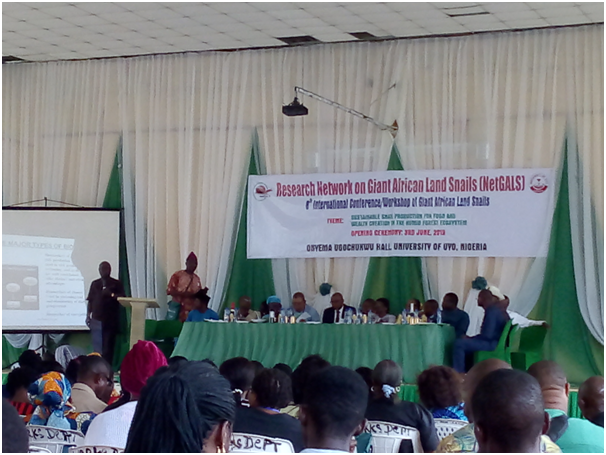By Victoria Orok
The just-ended 8th International Conference/Workshop on Giant African Land Snails has advocated snail farming as a viable business to help in reducing unemployment rate in the society.
Organised by Research Network on Giant African Land Snails (NetGALS), the three-day conference said snails were easy to farm because they are herbivorous and do not discriminate between living or dead plants.
The conference with its theme “Sustainable Snail Production for Food and Wealth Creation in The Humid Forest Ecosystem” held at Onyema Ugochukwu Hall, University of Uyo Town Campus, Uyo, Nigeria, listed leaves, flowers, fruits, fungi, pawpaw, stems, barks, nuts and other vegetables as common foods of snails.
“Another reason to venture into snail farming is the hermaphroditic nature of snails, they have the capacity to self-fertilize which means they have the reproduction organs for both male and female,” the conference added.
Earlier, Enefiok E. Essien (SAN), the Vice Chancellor of University of Uyo, had appreciated the NetGALS executive council for choosing to bring their very important conference/workshop to Uniuyo.
Essien, a professor who was represented by Nyaudo Ndaeyo, another professor reminded them that the essence of internship programme in the 400-level of the Faculty of Agriculture was for them to be practically exposed in agriculture which will make them to be independent immediately after graduation as well as become entrepreneurs in the society.
Edem A. Eniang, an associate professor, who spoke on land snail conservation strategies in Southern Nigeria described snails as important food to humankind and the ecosystem nut that they were gradually being eaten out of existence in Nigeria.
Eniang who was also the first plenary speaker proved the fact that snails have become very exorbitant and could only be afforded by the rich, adding that, while juvenile and immature snails were being sold all over the place, their prices were increasing geometrically whereas the quantity and value for money was declining rapidly.
He urged Nigerians to explore innovative ex-situ conservation of snails in all areas as well as start working at community and national levels to sustain in-situ snails’ conservation as strategies towards sustainable snails production and conservation.
Eniang called on the state government to establish at least two Protected Areas (Pas) in the state using the Ecosystem approach as prescribed by the World Conservation Union (IUCN) for the conservation of wildlife biodiversity.
Ime R. Udotong, a professor spoke on snails as environmental bio-markers, saying snails can be used as an indicator of environmental pollution and are sensitive to environmental pollutant.
Udotong who was also the second plenary speaker said a good bio-marker must be biologically, methologically and with societal relevance.
To know whether an ecosystem is habitable, he opined the introduction of African giant snails into such an environment like Ogoni land, if the snails are doing fine that means the environment can support life.
Udotong advocated the use of GALs as bio-markers of environmental pollution.
The keynote speaker, Kingsley Essien Akpabio who spoke on “Threats of Climate Change on Land Snail Diversity,” said rain pattern, temperature, water quality, drought, humidity and soil type affect land snails.
Akpabio, a professor, advised the audience to stock different species of snails in order to withstand the climatic variables.
The President of NetGALS, Mrs A.O Akinnusi a PH.d holder, highlighted the economic importance of snails to mankind, encouraging undergraduates to venture into snail farming business instead of waiting for white collar jobs to reduce poverty.
Akinnusi, a PH.d holder, advised farmers to farm different species of snails for better production.

